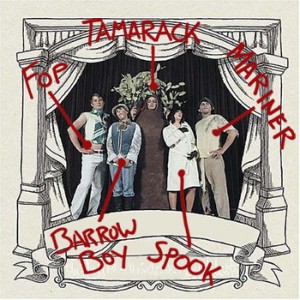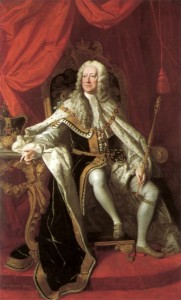The Annotated Decemberists No. 5: “I Don’t Mind”
 Perhaps no band’s lyrics better lend themselves to pseudo-academic analysis than those of The Decemberists. The Annotated Decemberists is an attempt to puzzle through the Portland, Oregon, group’s entire catalog song by song—examining all the obscure vocabulary, historical references and poetic subtext—or go crazy trying.
Perhaps no band’s lyrics better lend themselves to pseudo-academic analysis than those of The Decemberists. The Annotated Decemberists is an attempt to puzzle through the Portland, Oregon, group’s entire catalog song by song—examining all the obscure vocabulary, historical references and poetic subtext—or go crazy trying.
I love this song. I’m a sucker for the tragic drama of minor subdominant chords (at least I think that’s what I’m talking about—the progression from E major to A minor), and it’s all over this song. Yet I can’t tell you what “I Don’t Mind” is about. Not specifically. Each verse introduces a character, but in each case it’s more about arresting imagery than a clear story line. But you know what? I don’t mind.
“I Don’t Mind”
from 5 Songs (2001, re-released 2003)
Truly, with his thorn in your side[1]
And you don’t know why
Julie dips her toe in the tide
And she don’t know why
No, she don’t know why she got
All dolled up[2] for a suicide[3]
And when the stage lights dimmed on the fading scrim[4],
It was morning before the cheering died

Is it too late to tell you that I don’t mind?
King George[5] in imperial robe
And a lazy eye
Knelt down as the semaphore[6] broke[7]
On his tawdry[8] bride
But we don’t know why he got
All stressed out on the motherland[9]
With his TV sets and his fighter jets
And the royal ubiquitous[10] handycam[11]
Is it too late to tell you that I don’t mind?
Here’s you with your mom on your back
Going into the woods[12]
She’s so proud that you’re staying on track
Like a good son should
But you don’t know why you got
All choked up when you said goodbye
And you can hear her still when the nights are still[13]
All crying out for calamine[14]
Is it too late to tell you that I don’t mind?
- The saying’s origins are often traced to 2 Corinthians 12:7, in which Paul uses a thorn as a metaphor to describe some troubling thing or person that was sent to keep him from getting too conceited on account of having such nifty religious visions. Here’s the King James Version: “And lest I should be exalted above measure through the abundance of the revelations, there was given to me a thorn in the flesh, the messenger of Satan to buffet me, lest I should be exalted above measure.↑
- The Phrase Finder says, “‘Doll up’ meaning ‘to dress up’ comes from the 1930s, according to ‘Flappers 2 Rappers: American Youth Slang’ by Tom Dalzell (Merriam-Webster Inc., Springfield, Md., 1996).”↑
- The subsequent lines indicate this isn’t a private suicide, it’s theatrical. Literature is full of tales of performers sacrificing themselves for their art, Black Swan being one of the most obvious, recent examples. Another interpretation is that Julie is an actress playing a character who commits suicide, as in Romeo and Juliet.↑
- “n. 1 a light, sheer, loosely woven cotton or linen cloth, used for curtains, upholstery linings, etc. 2 a hanging of such cloth used in theatrical productions either as an opaque back-drop or as a semitransparent curtain, depending on the lighting.” Despite being a member of the International Thespian Society, I’m not sure whether “fading scrim” refers to a certain kind of scrim used for a particular effect or if it just describes the way the curtain vanished from view as the lights dimmed.↑
- There have been numerous monarchs named George, including six English kings, the most famous of whom are King George III, who reigned during the American Revolution and Napoleonic Wars, and King George VI, who overcame a severe stutter to defeat Nazi Germany and looked like Colin Firth. Did any of them have a lazy eye? A cursory scan of Wikipedia tells me that George II was blind in one eye when he died. Does that work for you?↑
- “n. 1 any apparatus for signaling, as the arrangement of lights, flags, and mechanical arms on railroads 2 a system of signaling by the use of two flags, one held in each hand: the letters of the alphabet are represented by the various positions of the arms.”↑
- The use of “broke” here is confusing, for me anyway. Encrypted codes can be broken. A railroad semaphore signal could literally break. But neither of these would happen “on” a person. Maybe it has something to do with semaphores in the computer-science sense, and a programmer can explain it to me.↑
- “adj. cheap and showy; gaudy; sleazy.”↑
- Thus sayeth Wikipedia: “People from Australia and former British colonies would sometimes describe the United Kingdom as the “Mother Country”, often carrying a strong British Imperialist connotation, and not always in a flattering manner.”↑
- “adj. present, or seeming to be present, everywhere at the same time; omnipresent.”↑
- A brand Sony has used for its video cameras since 1985. That makes it an apparent anachronism. King George VI may have witnessed jets and television before his death in 1952, but not camcorders.↑
- It sure sounds to me like this verse describes an elderly, infirm woman being abandoned in the woods. It also seems reminiscent of a folk tale—perhaps because “the woods” are so prominent in Grimms’ Fairy Tales as a place for outcasts—though I can’t point to a specific example. Folklore is rife with descriptions of euthanasia and geronticide, however, as this academic review makes clear.↑
- It sure sounds to me like the son is haunted by the memory of his mother and thinks he can still hear her.↑
- A mixture of zinc oxide and iron oxide, used in lotion to provide relief from itching. I went through an entire bottle of the stuff when I had chicken pox, for example.↑